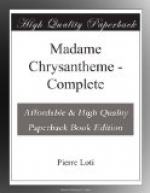Then comes her toilette for the night. With a certain grace she lets fall the day-dress, and slips on a more simple one of blue cotton, which has the same pagoda sleeves, the same shape all but the train, and which she fastens round her waist with a sash of muslin of the same color.
The high head-dress remains untouched, it is needless to say—that is, all but the pins, which are taken out and laid beside her in a lacquer box.
Then there is the little silver pipe that must absolutely be smoked before going to sleep; this is one of the customs which most provoke me, but it has to be borne.
Chrysantheme squats like a gipsy before a certain square box, made of red wood, which contains a little tobacco-jar, a little porcelain stove full of hot embers, and finally a little bamboo pot serving at the same time as ash-tray and cuspidor. (Madame Prune’s smoking-box downstairs, and every smoking-box in Japan, is exactly the same, and contains precisely the same objects, arranged in precisely the same manner; and wherever it may be, whether in the house of the rich or the poor, it always lies about somewhere on the floor.)
The word “pipe” is at once too trivial and too big to be applied to this delicate silver tube, which is perfectly straight and at the end of which, in a microscopic receptacle, is placed one pinch of golden tobacco, chopped finer than silken thread.
Two puffs, or at most three; it lasts scarcely a few seconds, and the pipe is finished. Then tap, tap, tap, tap, the little tube is struck smartly against the edge of the smoking-box to knock out the ashes, which never will fall; and this tapping, heard everywhere, in every house, at every hour of the day or night, quick and droll as the scratchings of a monkey, is in Japan one of the noises most characteristic of human life.
“Anata nominase!” ("You must smoke too!”) says Chrysantheme.
Having again filled the tiresome little pipe, she puts the silver tube to my lips with a bow. Courtesy forbids my refusal; but I find it detestably bitter.
Before laying myself down under the blue mosquito-net, I open two of the panels in the room, one on the side of the silent and deserted footpath, the other on the garden side, overlooking the terraces, so that the night air may breathe upon us, even at the risk of bringing the company of some belated cockchafer, or more giddy moth.
Our wooden house, with its thin old walls, vibrates at night like a great dry violin, and the slightest noises have a startling resonance.
Beneath the veranda are hung two little AEolian harps, which, at the least ruffle of the breeze running through their blades of grass, emit a gentle tinkling sound, like the harmonious murmur of a brook; outside, to the very farthest limits of the distance, the cicalas continue their sonorous and never-ending concert; over our heads, on the black roof, is heard passing, like a witch’s sabbath, the raging battle, to the death, of cats, rats, and owls.




